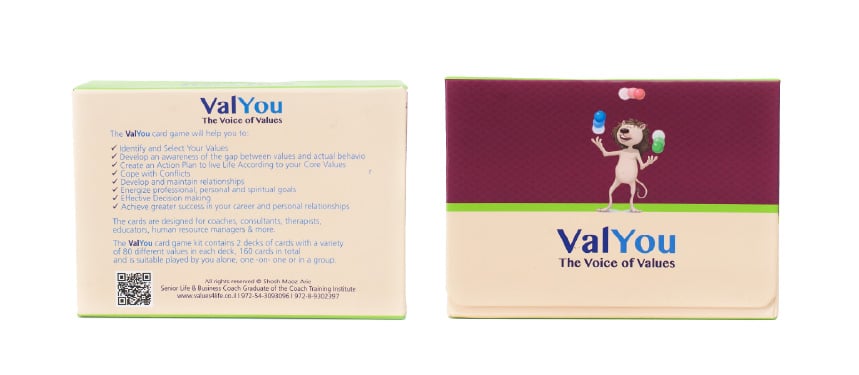

דף הבית » Our values
We all live our lives on the fast track, running from place to place, trying to fit it all in. We try to manage everything: work, family life, kids and, hopefully some spare time for ourselves.
We feel guided by some big master plan, hoping that our actions are some kind of an outcome of our values, ideas and points of view.
But how many times do we really stop to think about what we believe are the most important values of our life? When lately did we seriously sit down to prioritize our concepts and believes?
Our values represent who we really are. They reflect our personal and individual essence. Our underlying values translate into the way we express ourselves and relate to things, people, and the environment in general. Our values serve as our compass, showing us the significance of being true to ourselves.
A better congruency between our values and way of living leads to a more enjoyable and fulfilling life in general. Conversely, maintaining life habits and patterns incongruent with our personal values, leads to suffering, lack of self-fulfillment and self-realization, and makes our life miserable.
Imagine a school kid during a math exam, for which he has prepared exhaustively. His best friend and desk partner, asks him to help him cheat on the exam and allow him to copy from his sheet. What would you decide to do in this case?
Some kids would define this act as a gesture of friendship and would allow it, feeling that this is their duty as a 'good friend'.
Others would not, feeling a contradiction between what they believe as integrity and their friendship. In their perception, the value of integrity might be the stronger one, and therefore 'overpower' friendship.
Let's take another example: A junior high girl that plays the piano for many hours a day. She is very dedicated to her hobby, but yet sometimes feels the contradiction between the time she is expected to devote to the piano and her desire to spend more time with her girlfriends at the mall or just hanging out. The piano is indeed one of her ways to express herself and in that manner very important to her, but so is her social life.
Sometimes, while trying to understand the contradictions between two of our values, especially while dealing with kids, we find other values hidden inside, which involve the need to satisfy the parents. Many times there is a hidden clash between the family values we were taught to live upon, and the ones we actually perform.
The identification of our values, and the possible clashed between them, is exactly the concept behind the new family game, We all live our lives on the fast track, running from place to place, trying to fit it all in. We try to manage everything: work, family life, kids and, hopefully some spare time for ourselves.
We feel guided by some big master plan, hoping that our actions are some kind of an outcome of our values, ideas and points of view.
But how many times do we really stop to think about what we believe are the most important values of our life? When lately did we seriously sit down to prioritize our concepts and believes?
Our values represent who we really are. They reflect our personal and individual essence. Our underlying values translate into the way we express ourselves and relate to things, people, and the environment in general. Our values serve as our compass, showing us the significance of being true to ourselves.
A better congruency between our values and way of living leads to a more enjoyable and fulfilling life in general. Conversely, maintaining life habits and patterns incongruent with our personal values, leads to suffering, lack of self-fulfillment and self-realization, and makes our life miserable.
Imagine a school kid during a math exam, for which he has prepared exhaustively. His best friend and desk partner, asks him to help him cheat on the exam and allow him to copy from his sheet. What would you decide to do in this case?
Some kids would define this act as a gesture of friendship and would allow it, feeling that this is their duty as a 'good friend'.
Others would not, feeling a contradiction between what they believe as integrity and their friendship. In their perception, the value of integrity might be the stronger one, and therefore 'overpower' friendship.
Let's take another example: A junior high girl that plays the piano for many hours a day. She is very dedicated to her hobby, but yet sometimes feels the contradiction between the time she is expected to devote to the piano and her desire to spend more time with her girlfriends at the mall or just hanging out. The piano is indeed one of her ways to express herself and in that manner very important to her, but so is her social life.
Sometimes, while trying to understand the contradictions between two of our values, especially while dealing with kids, we find other values hidden inside, which involve the need to satisfy the parents. Many times there is a hidden clash between the family values we were taught to live upon, and the ones we actually perform.
The identification of our values, and the possible clashed between them, is exactly the concept behind the new family game, We all live our lives on the fast track, running from place to place, trying to fit it all in. We try to manage everything: work, family life, kids and, hopefully some spare time for ourselves.
We feel guided by some big master plan, hoping that our actions are some kind of an outcome of our values, ideas and points of view.
But how many times do we really stop to think about what we believe are the most important values of our life? When lately did we seriously sit down to prioritize our concepts and believes?
Our values represent who we really are. They reflect our personal and individual essence. Our underlying values translate into the way we express ourselves and relate to things, people, and the environment in general. Our values serve as our compass, showing us the significance of being true to ourselves.
A better congruency between our values and way of living leads to a more enjoyable and fulfilling life in general. Conversely, maintaining life habits and patterns incongruent with our personal values, leads to suffering, lack of self-fulfillment and self-realization, and makes our life miserable.
Imagine a school kid during a math exam, for which he has prepared exhaustively. His best friend and desk partner, asks him to help him cheat on the exam and allow him to copy from his sheet. What would you decide to do in this case?
Some kids would define this act as a gesture of friendship and would allow it, feeling that this is their duty as a 'good friend'.
Others would not, feeling a contradiction between what they believe as integrity and their friendship. In their perception, the value of integrity might be the stronger one, and therefore 'overpower' friendship.
Let's take another example: A junior high girl that plays the piano for many hours a day. She is very dedicated to her hobby, but yet sometimes feels the contradiction between the time she is expected to devote to the piano and her desire to spend more time with her girlfriends at the mall or just hanging out. The piano is indeed one of her ways to express herself and in that manner very important to her, but so is her social life.
Sometimes, while trying to understand the contradictions between two of our values, especially while dealing with kids, we find other values hidden inside, which involve the need to satisfy the parents. Many times there is a hidden clash between the family values we were taught to live upon, and the ones we actually perform.
The identification of our values, and the possible clashed between them, is exactly the concept behind the new family game, "Al Ma Velama", developed by Shosh Maoz-Arie, an experienced Personal, Business & ADHD Coach from Israel.
The game, in which kids and families prioritize core values, is a clever, simple, and enjoyable game intended to rehearse real life, while advancing parent-child communication, and reaching out mutually.
The game is a card game, created in order to initiate an open, deliberate, and safe dialogue about values – emanating from play and a pleasurable experience. The cards are a tool, creating the environment for the dialogue to take place.
The game is simple and friendly and contains 160 cards featuring a visual list of values. As the game progresses, the most important values "appear" up to the surface, allowing each player a real encounter with himself.
The card game allows experiential, undemanding, and fun-filled learning, including the display, sorting, and selection of optional values, focusing, defining goals, and translating them from theory into practice.
The emphasis is on identifying and choosing common values rather than teaching them. It is something that demands true, non-judgmental listening.
The great thing about the family game, besides the quality time, is that in this game, the family meeting must consist of a dialogue with everyone on an equal base.
The questions, which arouse from the game, comprise the principle tool and have much more importance than their answers.
Through play the family members identify their own values, whether and how they affect their lives, whether they implement them, and how they can reach their goals when choosing to act in accordance with them.
The game allows an investigation of the gap that exists between reality and our ideals through an examination of our values and differentiating between them. In short, it develops awareness of the gap between our values and our actual, day to day behavior.
It's like one mother that has already tried the game told me:
“The game made me really think about what is truly important to me in life. The
Topics, such as “controlling myself” – I had never thought about what I can or can’t control. For example, when arguing with a friend, I almost never accept or am even able to accept their position. In conclusion – the game expanded my thinking, and caused me much deliberation, forcing me to decide what I would do and how I would behave in such situations.”
In conclusion, maybe next time, when looking for a new family game to enjoy your quality time with, you might want to consider the value game as a good option for monopoly. developed by Shosh Maoz-Arie, an experienced personal and business coach from Israel
The game, in which kids and families prioritize core values, is a clever, simple, and enjoyable game intended to rehearse real life, while advancing parent-child communication, and reaching out mutually.
The game is a card game, created in order to initiate an open, deliberate, and safe dialogue about values – emanating from play and a pleasurable experience. The cards are a tool, creating the environment for the dialogue to take place.
The game is simple and friendly and contains 160 cards featuring a visual list of values. As the game progresses, the most important values "appear" up to the surface, allowing each player a real encounter with himself.
The card game allows experiential, undemanding, and fun-filled learning, including the display, sorting, and selection of optional values, focusing, defining goals, and translating them from theory into practice.
The emphasis is on identifying and choosing common values rather than teaching them. It is something that demands true, non-judgmental listening.
The great thing about the family game, besides the quality time, is that in this game, the family meeting must consist of a dialogue with everyone on an equal base.
The questions, which arouse from the game, comprise the principle tool and have much more importance than their answers.
Through play the family members identify their own values, whether and how they affect their lives, whether they implement them, and how they can reach their goals when choosing to act in accordance with them.
The game allows an investigation of the gap that exists between reality and our ideals through an examination of our values and differentiating between them. In short, it develops awareness of the gap between our values and our actual, day to day behavior.
It's like one mother that has already tried the game told me:
“The game made me really think about what is truly important to me in life. The
Topics, such as “controlling myself” – I had never thought about what I can or can’t control. For example, when arguing with a friend, I almost never accept or am even able to accept their position. In conclusion – the game expanded my thinking, and caused me much deliberation, forcing me to decide what I would do and how I would behave in such situations.”
In conclusion, maybe next time, when looking for a new family game to enjoy your quality time with, you might want to consider the value game as a good option for monopoly.
, developed by Shosh Maoz-Arie, an experienced personal and business coach from Israel.
The game, in which kids and families prioritize core values, is a clever, simple, and enjoyable game intended to rehearse real life, while advancing parent-child communication, and reaching out mutually.
The game is a card game, created in order to initiate an open, deliberate, and safe dialogue about values – emanating from play and a pleasurable experience. The cards are a tool, creating the environment for the dialogue to take place.
The game is simple and friendly and contains 160 cards featuring a visual list of values. As the game progresses, the most important values "appear" up to the surface, allowing each player a real encounter with himself.
The card game allows experiential, undemanding, and fun-filled learning, including the display, sorting, and selection of optional values, focusing, defining goals, and translating them from theory into practice.
The emphasis is on identifying and choosing common values rather than teaching them. It is something that demands true, non-judgmental listening.
The great thing about the family game, besides the quality time, is that in this game, the family meeting must consist of a dialogue with everyone on an equal base.
The questions, which arouse from the game, comprise the principle tool and have much more importance than their answers.
Through play the family members identify their own values, whether and how they affect their lives, whether they implement them, and how they can reach their goals when choosing to act in accordance with them.
The game allows an investigation of the gap that exists between reality and our ideals through an examination of our values, and differentiating between them. In short, it develops awareness of the gap between our values and our actual, day to day behavior.
It's like one mother that has already tried the game told me:
“The game made me really think about what is truly important to me in life. The topics , such as “controlling myself” – I had never thought about what I can or can’t control. For example, when arguing with a friend, I almost never accept or am even able to accept their position. In conclusion – the game expanded my thinking, and caused me much deliberation, forcing me to decide what I would do and how I would behave in such situations.”
In conclusion, maybe next time, when looking for a new family game to enjoy your quality time with, you might want to consider the value game as a good option for monopoly.
קידום אתרים בגוגל – מוקה קריאייטיב
WhatsApp us
